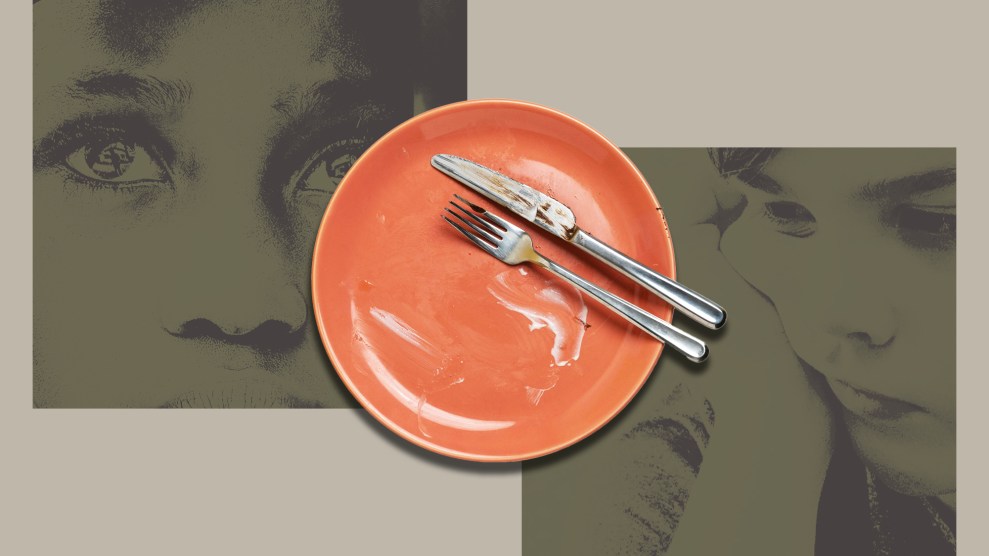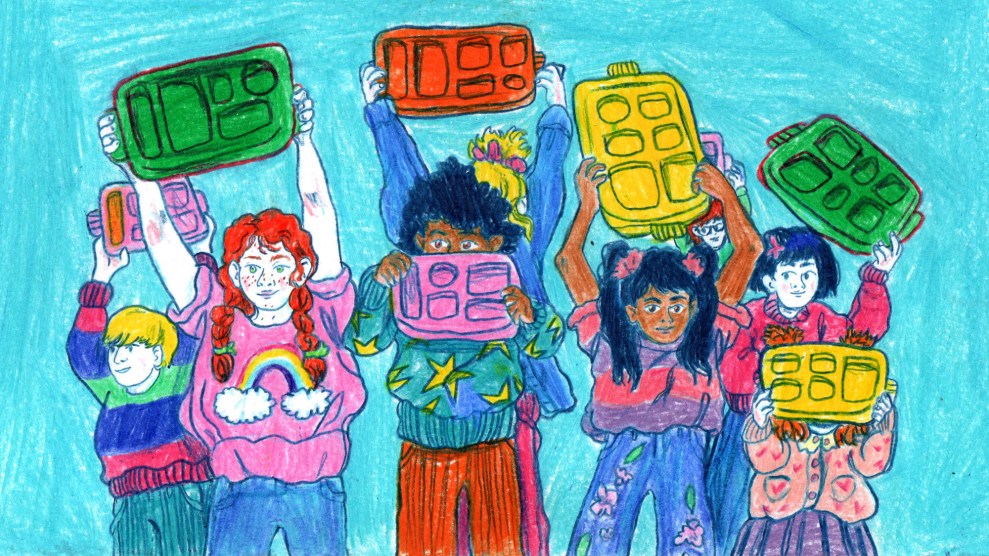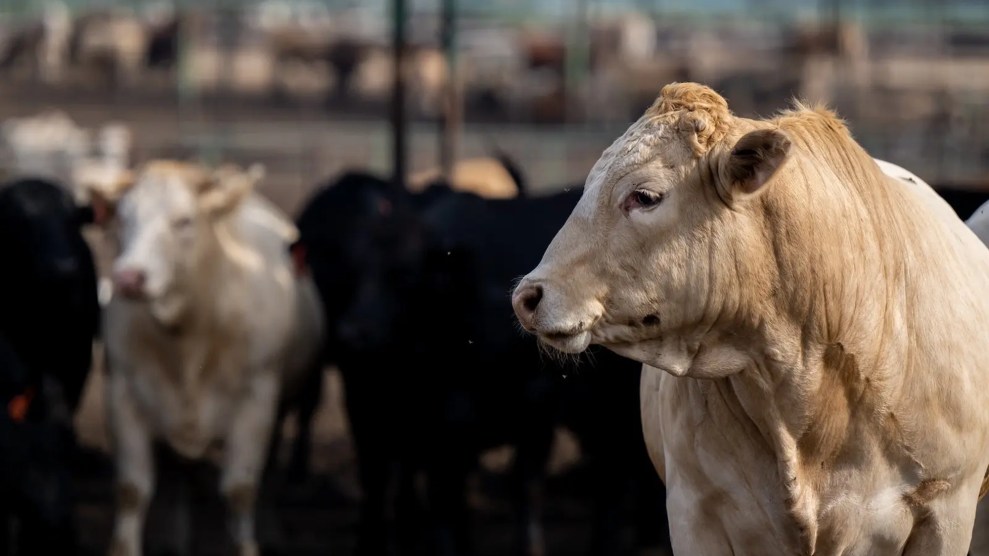
Mother Jones illustration; Joshua Oluwagbemiga; Jonathan Greenaway; Thomas Park/Unsplash (3)
When I spoke to Mandi Remington in late January, she had $7 in her bank account and had run out of milk. At times like these, which happen toward the end of most months, she cobbles together “stone soup” from what’s in the house, she said, or feeds her three children and then makes her own meal from whatever is left on their plates.
So when she found out that Iowa, where she lives in Iowa City, is among the 15 states that decided not to participate in Summer EBT, a new federal food program that would have sent her $40 a month per child while they were out of school, “it was extremely frustrating,” she said. As a single parent who doesn’t receive child support, Remington struggles to make ends meet. Her $55,000 annual salary as a medical records clerk at the University of Iowa Hospitals & Clinics “does not leave much leftover for gas in the car and groceries,” she said, yet she earns too much to qualify for Medicaid and food stamps.
But she did qualify for Pandemic EBT for the past two years—a federal benefit that sent parents of students who qualify for free or reduced meals up to $120 per child while kids were out of school for remote learning or summer break. “It was extraordinarily helpful,” she said. The money meant “being able to eat fresh foods, being able to continue to get milk and things like that toward the end of the month—instead of throwing together whatever we could get out of cans.”
Iowa’s decision not to participate in Summer EBT, the first new federal food program in decades, will mean “a lot more struggling to feed my kids proper healthy foods,” she said. Iowa wasn’t the only state to refuse the funds: Alabama, Alaska, Florida, Georgia, Idaho, Louisiana, Mississippi, Nebraska, Oklahoma, South Carolina, South Dakota, Texas, Vermont, and Wyoming opted not to enroll by the early January deadline. All of those states have one thing in common: They are helmed by Republican governors.
Congress built on the Pandemic EBT model, which was passed as part of its Covid relief bills, to create the permanent Summer EBT program at the end of 2022. The US Department of Agriculture had originally estimated that 29 million children would benefit, but that number has dropped to 21 million after 15 states declined to participate, meaning 8 million kids will miss out.
Why would states turn back what’s essentially free aid for children? Iowa’s Gov. Reynolds said the program “does nothing to promote nutrition at a time when childhood obesity has become an epidemic.” But the results of a USDA Summer EBT pilot that ran from 2011 to 2013 showed the opposite effect: The program led to children eating more fruits, vegetables, and whole grains than kids whose families did not receive the benefit, suggesting the money allowed parents to buy healthier foods. (Reynolds’s office did not respond to multiple requests for comment.)
Some Republican politicians, including Oklahoma Governor Kevin Stitt, claim existing federal and state programs are adequate for keeping children fed in the summer. South Dakota Kristi Noem’s chief of communications Ian Fury said the state already has “robust existing food programs,” and that federal funding comes “with strings attached, and more of it is often not a good thing.” A spokesperson for Florida’s Department of Children and Families also said the state will rely on existing programs because federal programs “inherently always come with some federal strings attached.” To participate, states are required to cover half of the administrative costs and adhere to the rules the USDA puts out, which guide who is eligible and how to craft applications.
The federal nutrition programs in place miss many families, however. The USDA’s Summer Food Service Program, for instance, largely only serves meals at specific sites that require kids to eat them then and there, posing a huge hurdle for working parents or those in rural areas. Only about one in six eligible children receive the meals. “We encourage families to work and then we have these programs kids can’t access because families are working,” noted Pat Van Burkleo, executive director of Feeding Louisiana. Summer EBT, on the other hand, will load the benefits onto cards, which families can use at many grocery stores and even farmer’s markets.
Other governors have made their opposition to Summer EBT more overtly political. Both Nebraska Governor Jim Pillen and Mississippi Governor Tate Reeves called the program “welfare.” But advocates point out that this thinking is shortsighted.
They argue that refusing to participate in Summer EBT will hurt states’ economies in both the short- and long-term. Collectively, the states that have opted out are giving up an estimated $1.2 billion in benefits. Florida, for example, is missing out on a whopping $259 million. “That’s an awful lot of money to turn down that would have gone to a great cause of feeding children,” said Cindy Huddleston, senior policy analyst at the Florida Policy Institute. The economic impact of the benefits would likely have been even greater, given that food stamps have been found to have a multiplier effect of at least 1.5. When families use food stamps at local grocery stores, that boosts those businesses and others in their supply chains.
Some states had balked at having to pay for half of the administrative cost of running the new program. Governor Reynolds claimed it would cost Iowa $2.2 million to administer, a dubious number given that it costs the state the same sum to run the entire SNAP program for an entire year, which serves far more families. Nebraska Appleseed has estimated Summer EBT would cost its state just $300,000 to administer, and would bring the state $18 million in funding. “That’s a pretty good deal,” Savaiano noted. Even with Florida shouldering administrative costs, Huddleston said, “the cost in not doing the program is actually greater to the state than it would be if they do the program.”
Alabama, Louisiana, Mississippi, Oklahoma, South Carolina, and Texas all already rank in the top ten states with the highest food insecurity rates. The USDA’s Summer EBT pilot program reduced food insecurity by nearly a fifth among children when it gave parents $60 per month. Forgoing Summer EBT will almost certainly mean more hungry kids, which is expensive in the long run, given it can lead to “lost workforce hours, poor educational outcomes, and health issues,” said Chris Bernard, president of Hunger Free Oklahoma.
If kids struggle to find meals during their break from school it will also mean the typical academic brain drain will be “more severe,” Bernard said. “We already have a learning slide in the summer and we don’t want them to have a hunger slide in the summer also,” Van Burkleo agreed.
Some advocates still hold out hope that their states will decide to opt in next year, especially as there were some concerns among state lawmakers about being able to set up a new program in a short amount of time to serve children this summer. Some hope they might even do it this year; state senators in Nebraska have filed legislation with bipartisan support that would force the state to participate in 2024.
Remington, who has channeled her frustration with her state lawmakers’ actions into a run for Johnson County supervisor, doesn’t think Summer EBT should get caught up in typical political fights. As she sees it, food for children “is a very basic need and it should not have anything to do with party lines.”
This story was produced in partnership with the Food & Environment Reporting Network, a nonprofit news organization.

















